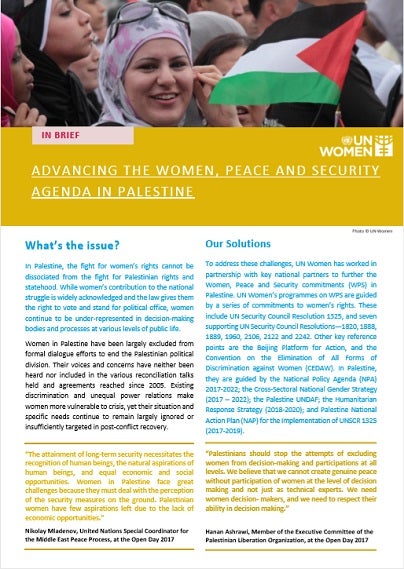In Palestine, the fight for women’s rights cannot be dissociated from the fight for Palestinian rights and statehood. While women’s contribution to the national struggle is widely acknowledged and the law gives them the right to vote and stand for political office, women continue to be under-represented in decision-making bodies and processes at various levels of public life.
Women in Palestine have been largely excluded from formal dialogue efforts to end the Palestinian political division. Their voices and concerns have neither been heard nor included in the various reconciliation talks held and agreements reached since 2005. Existing discrimination and unequal power relations make women more vulnerable to crisis, yet their situation and specific needs continue to remain largely ignored or insufficiently targeted in post-conflict recovery.
To address these challenges, UN Women has worked in partnership with key national partners to further the Women, Peace and Security commitments (WPS) in Palestine. UN Women’s programmes on WPS are guided by a series of commitments to women’s rights. These include UN Security Council Resolution 1325, and seven supporting UN Security Council Resolutions—1820, 1888, 1889, 1960, 2106, 2122 and 2242. Other key reference points are the Beijing Platform for Action, and the Convention on the Elimination of All Forms of Discrimination against Women (CEDAW). In Palestine, they are guided by the National Policy Agenda (NPA) 2017-2022; the Cross-Sectoral National Gender Strategy (2017 – 2022); the Palestine UNDAF; the Humanitarian Response Strategy (2018-2020); and Palestine National Action Plan (NAP) for the Implementation of UNSCR 1325 (2017-2019).
Advancing the Women, Peace and Security Agenda in Palestine (English)
Advancing the Women, Peace and Security Agenda in Palestine (Arabic)

